What's the latest with solar farms in Northern Ireland?

What is a solar farm?
A solar farm is a large-scale installation of solar photovoltaic (PV) panels, constructed to generate renewable 'green' electricity. Solar farms are typically installed in rural areas and can cover anything from 1 to 100 acres.
Planning Guidance
The installation of solar panels on private land may be considered a 'permitted development', and therefore may not require planning permission. However, there are limits to what is permitted. It is essential to seek guidance from your local planning authority before considering any type of large-scale solar installation.
According to Planning NI, development may not be permitted for panels proposed:
- In an Area of Outstanding Natural Beauty (AONB), National Park, World Heritage Site (WHS) or Conservation Area, where panels could reduce the visual impact of these sites.
- In an Area of Special Scientific Interest (ASSI) or Site of Archaeological Interest.
- Within the curtilage of a Listed Building, unless Listing Building consent for the development has previously been granted.
The installation of solar farms throughout the UK and Ireland has been met with a mixed response. One reason for this is the fact that solar farms are taking up space that could be used for food and farming. Agriculture is a vital industry for the UK, and many feel that the land could be better used for agricultural purposes, instead of solar generation. However, the other view is that solar technology can help to reduce carbon emissions from industry, create local employment and produce energy renewable energy for businesses that would otherwise come from the grid.
Recent Projects in Northern Ireland
In August 2018, Lightsource BP officially opened a 6.42MW solar installation at Gibson Farm in Mallusk, providing power to Brett Martin, a manufacturing company just over a mile away. The installation will produce enough renewable electricity, to provide 14% of the company’s annual demand, in turn saving an estimated 2000 tonnes of carbon emissions each year.
The Gibson Farm solar installation was also developed alongside an in-depth biodiversity management plan; detailing planting measures designed to support local wildlife. Planting measures include seeding choices specifically designed to foster new insect and bird species, strengthening the biodiversity of the local area and providing significant environmental benefits to the surrounding farmland.
Another recent solar farm project has been completed to supply the energy needs at Dunore Water Treatment Works in South Antrim, one of Northern Ireland’s largest water treatment facilities. The project involved the installation of 24,000 solar panels across a 33-acre site and cost approximately £7million to complete. This installation will provide a peak output of 4.99MW, with spare capacity going to the grid. It is expected to save approximately 2,000 tonnes of carbon every year, in addition to saving the company over half a million pounds annually in energy costs.
A large-scale solar installation is certainly not cheap, and the closure of the Renewable Obligation Certificates (ROCs) incentive scheme means that any new installation will not be eligible for annual ROC payments to help with the payback. Despite this, solar technology can still be a worthwhile undertaking, particularly for businesses that have high electricity demand during the day. The business can reap the benefit of the renewable electricity generated on site during the day and therefore reduce the amount of energy purchased electricity from the grid – as well as offsetting their carbon footprint.
Find out more
For the latest in solar trends and technology, take a look at our recent interview with Professor Brian Norton, Principal of Technological University Dublin.



